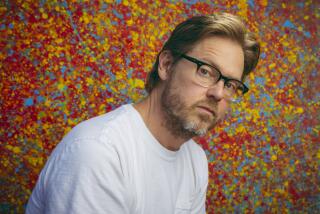Temianka Selects a Slower Tempo
Don’t get the wrong idea, says Henri Temianka. The veteran violinist-conductor-raconteur may be leaving the concert stage, but he is not abandoning the musical arena.
“For the first time--and I really think it’s true--I’m going to spend some time looking backward instead of forward,” the 84-year-old impresario said this week in announcing that the Sunday afternoon California Chamber Virtuosi concert at Pepperdine University will mark the end of his concert career.
For musical Los Angeles, it would seem, a particular era will end in Malibu over the weekend when the seventh season of Virtuosi concerts in Smothers Theatre comes to a close.
As has been his habit for some time now, Temianka will not play his violin at this last appearance by his ad-hoc Chamber Virtuosi, the latest group founded by this musical gadfly. But he will, of course, provide colorful commentary on the music between pieces.
He will still continue to play, he says, but only at the annual spring series he has presented in Los Angeles-area schools since 1958.
Interviewed in his rambling Rancho Park home, Temianka proudly shows a visitor a scrapbook put together by appreciative students at Graham Elementary School in Downey after he brought a chamber concert to their school in April.
“I am retiring from playing in public, but I will make an exception for these school performances, as long as I can,” he said.
Born in Scotland of Polish-Jewish parents, Temianka came to this country in the 1920s, attended the Curtis Institute of Music in Philadelphia--where he was a student in violin of Carl Flesch and in conducting of Artur Rodzinski--and toured internationally after his graduation in 1930.
After a season as concertmaster of the Pittsburgh Symphony under Reiner, he came to California in the mid-’40s. He has now been a Los Angeles resident for nearly 50 years. Always part of the social scene, he has been associated with the city’s literati from Thomas Mann, Aldous Huxley, Lion Feuchtwanger and Norman Cousins. (To this day, he can’t understand how he was excluded from the local musical Establishment’s recent “Exiles in Paradise” shows about musicians and artists who fled the Nazis during World War II.)
Those have been busy years. Temianka founded the Paganini Quartet in 1946, and toured with that much-admired ensemble for two decades; he disbanded the quartet in 1966. He founded the California Chamber Symphony in 1960, and led its subscription concerts in Royce Hall at UCLA for nearly a quarter-century.
After 11 seasons, last November he abandoned leadership of the Croissants and Chamber Music series at the Mark Taper Forum of the Music Center. Earlier, he had presented 10 seasons of summer chamber music concerts at the Getty Museum.
“All these years, I’ve always been thinking of the next project, and leaving the last ones behind,” the white-haired, apparently mellow musical veteran confided, sitting in the quiet living room of the comfortable Spanish-style house where he and his wife of 48 years, Emmy, have lived, and raised their two sons, since the ‘50s. The walls are covered with photographs of his friends Copland, Piatigorsky, Menuhin, Milhaud and Cousins, with books of every description overlooking a well-used Steinway piano.
“As I rummage through my memorabilia, I find out about things I’ve done that I have practically forgotten.”
Among these projects are three musical-educational films he produced between 1965 and 1975. Temianka says he “rediscovered” them recently in his basement.
One, “From Bach to Rock,” deals in music, according to Temianka: “I start out by talking to Ray Manzarek of the Doors. Among other drop-in guests is (the late jazz drummer) Shelly Manne.”
Another is called “Meet the Master,” and consists of interviews conducted by Temianka with three legendary, 20th-Century musicians, all now dead: Gregor Piatigorsky, Rudolf Serkin and Lauritz Melchior.
Choosing how to resurrect and/or distribute these films is one of Temianka’s planned projects. He also has books in the works.
“My first book, ‘Facing the Music’ (1973), will come out on book-tape from Cambria Records this month. I also plan to update it.
“My second book is nearly finished, but needs a publisher. It ought to be completed, but I keep making additions.”
A third book will be titled “The Art of Violin Playing” and draw upon the more than 100 magazine articles on the subject Temianka has written in these seven decades, and “is virtually finished.”
Asked for a comment on Temianka’s impending end of concertizing, a longtime Temianka observer, music-radio personality Carl Princi, said: “There is no one quite like Henri--he’s one of a kind.
“Some people never liked it when Henri spoke at his concerts, but I always found it delightful. He’s a wealth of information and has been very generous in sharing.”
Asked the same question, Pebbles Wadsworth, executive director of the UCLA Center for the Arts, gave a surprising response:
“I would have trouble commenting on his retirement when we are in the process of talking to him about presenting a series in Schoenberg Hall next season.”
Temianka, queried about the discrepancy, said: “I have no intention of returning to the stage after this week. I did talk to Pebbles about such a project--she tells the gospel truth--but have decided in the meantime not to accept her offer. This is the end.
“Naturally, I do not plan to jump off the Golden Gate Bridge tomorrow. I expect to be here for a while. But I am, after more than 4,000 concerts, leaving the stage. I promise you that.”
More to Read
The biggest entertainment stories
Get our big stories about Hollywood, film, television, music, arts, culture and more right in your inbox as soon as they publish.
You may occasionally receive promotional content from the Los Angeles Times.










